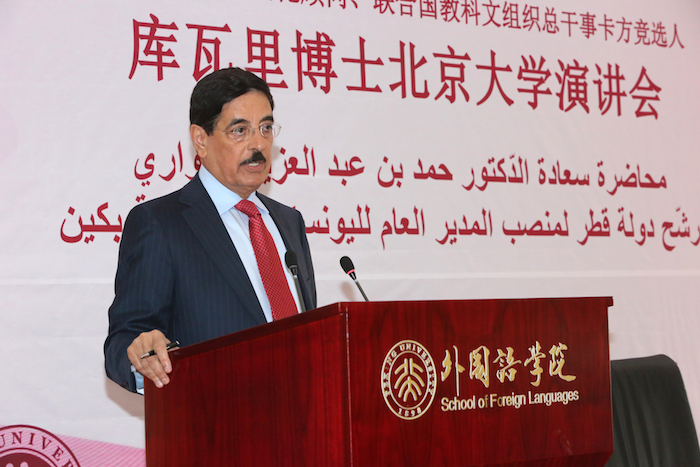On the October 13, 2016, the candidate for the position of Director General of UNESCO, Doctor Hamad Bin Abdulaziz Al-Kawari delivered a speech at the School of Foreign Languages of Peking University (PKU). Professor Fu Zhiming from the Department of Arabic in the School of Foreign Languages chaired the event. Doctor Kawari emphasized in his speech the significance of cultural exchange between China and State of Qatar, as well as encouraged people throughout the world to learn more about UNESCO and its work.

Doctor Kawari started with his sincere thanks to PKU, ambassadors of China from Arab countries, and the audience present. Despite the ups and downs the world has undergone in the last several decades, he pointed out that the Arab world and China have been enjoying close contact in terms of commercial activities and cultural events. Therefore, he stated that both sides have every reason to firmly believe in and maintain the harmony that emanated from our mutual understanding.
Then Doctor Kawari briefly introduced his understanding about and current situation and future direction of UNESCO. What UNESCO is confronted with now is its sharp financial crises that can be solved only by creative solutions. As a country closely following UNESCO’s principles and initiatives, China plays an important role in preserving and promoting cultural diversity globally.
In the next part of his speech, Doctor Kawari reviewed the history of Arab-Chinese relationships. Two travelers, Ibn Battuta and Wang Dayuan, had made significant contributions to the interaction between Arabic and Chinese culture. However, we have to get more people from the two regions involved in cultural exchanges in order to build mutual understanding.

Then Doctor Kawari stated his slogan of the candidacy campaign for management of UNESCO: “Towards a New Start”. He explained that an unavoidable target for UNESCO is to regain the key principles established by its initial founders. Currently, people around the world don’t have thorough understanding about UNESCO does, so what it needs to do is to enhance people’s visions and relation to let values of tolerance and human rights be consolidated.
Terrorism, he said, is destroying not only human being’s cultural heritage but also global peace. Back to a European conference concerning terrorism he attended, he firstly put forward the idea that it was necessary to establish a world anti-terrorism day to help teach people to tolerate each other’s culture and eliminate misunderstandings. Speaking of destroyed heritages, he further empathized that our collective cultural integration stems from our resplendent diversity and not simply from similarities. Cultural diversity is the wealth that human can never afford to lose.
In addition, he also spoke highly of China’s achievement in terms of cultural soft power construction and education improvement. Though years’ of efforts, China has helped millions of citizens to receive education. Similarly, Qatar also supported a number of projects, including “Educate a Child” initiative which successfully gave educational opportunities to over 10 million people globally. Here, Doctor Kawari cited a Chinese saying: “A jade stone is useless before it is processed, a man is good-for-nothing until he is educated” to illustrate the importance of education. Apart from solving people’s daily difficulties, education can also help to put forward with new ideas about social development. From which way, education becomes an essential method of realizing sustainable development.
At last, Doctor Kawari pointed out that the age we are living in is experiencing sensitive challenges that require common understandings from people around the world. He firmly believes that China is and will continue playing a critical role in this huge transformation. He again encouraged all countries to work together so as to achieve a new balance with a basis of mutual respect and understanding.
After the speech, Professor Fu presented an Arabic dictionary published by Peking University, a book about the relationship history between China and Arab countries, a book about China’s history in Arabic that translated by Peking University, and the poster of the event. Both sides expressed their heartfelt thanks to each other.
Written by: Kuang Huolingxiao
Edited by: Chen Meizhi
Photos by: Liu Yueling



